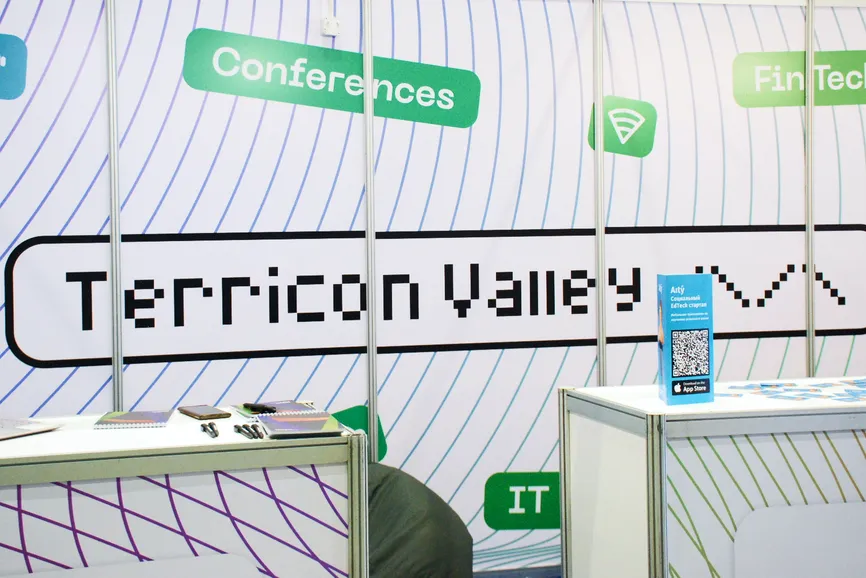Karagandy has long been dubbed as the city of miners, but Terricon Valley aims to transform the city brand into the country’s leading IT hub. Just like its counterpart on the other side of the globe, the Valley hopes to nurture aspiring entrepreneurs with the help of accelerators and business incubation programs.
The tech hub also functions as a workspace with affordable rent and coworking areas that gathers the field’s leading experts in data analysis, web development and business management.
Recently, Terricon Valley took part in the Digital Bridge 2022 in Astana, where a collective panel was held for some of its startups. QazMonitor correspondent interviewed the Valley’s head of business direction Diana Salekhova and some of the project leaders.
Describing the selection for the panel’s startups, Salekhova explained that she initially reviewed 80 startups that have shown good results during the accelerator program.
“The projects featured here basically grew up at the Terricon Valley and that is why we chose to showcase them at the Digital Bridge. Here, on the panel, we have those that achieved good results after eight weeks of our accelerator,” Salekhova said.
She continued by saying that after some consideration she had to reject applicants outside of the Valley’s programs since it was important to present projects that were developed specifically at the IT hub.
Aity: An app of 9,000 words
Social EdTech startup Aity is a mobile app for learning the Kazakh language through building vocabulary. The app helps the user study over 9,000 commonly used Kazakh words and offers daily speaking practice. Aity promises to raise the comprehension level to 90% after regular use.
According to project’s chief officer Aizhan Khassenova, the team of indie developers has considerable experience in the field of language learning. The members each had developed their own apps for learning English, Spanish and French with a minimum of 15,000 users.
At some point, Khassenova and her team thought: “Why not develop an app for the Kazakh language?”
“We intend to get 15,000 users on here as well. The app launched a couple of weeks ago and we already have 500 users who gave it a score of 4.9,” she said.
As a language app, Aity is a drop in the sea, but if it is about the Kazakh language market, the startup is virtually second to none.
Our experience made us realize that when one app contains every aspect of language learning, it becomes too overwhelming for people and they quit. Because of that, our app only deals with word learning.
The team shared they were hesitant at first to join the Valley’s incubator since their app is less complicated and faster to program compared to other projects there - but now Khassenova says that they have big plans. “In the future, we plan to make several different apps for studying Kazakh, including common phrases, grammar, and so on,” she concluded.
Fleetbook: From a DIY setup to becoming a partner of BI Group
Fleetbook is a logistics service that tracks vehicles for clients who own fleet facilities and want to monitor a driver’s movement and fuel consumption. The company installs tracking sensors inside the cabin which will then be traced real-time through any device.
This was a niche market at the time. By pure coincidence, we stumbled upon a special tracking system from Russia which was delivered here by train and found a client who was interested in it. We installed the device for free - it was basically a DIY setup.
According to Yuzbegov, the company’s primary customers are those who need to keep track of its fleet facilities, like farmers or repair services. “Even in the quarries, where there’s no communication services, we offer data transfer via Wi-Fi,” he added.
During the 14 years it has been on the market, the company has built an impressive clientele consisting of major corporations, such as BI Group and Kazakhdorstroy.
Q Core Center: Insurance, insurance, insurance
Q Core Center specializes in managing cold and warm calls in English-speaking communities and establishing call centers and sales departments. They work mostly in the United States, specifically in New York, California, and Washington.
Chief executive Vilsur Garifov shared: “We started out in the appliance repair industry. Our specialist's workflow consisted of answering customer calls, providing general services and overseeing the field technician personnel.”
On the question of the projects entry to the industry and its focus, Garifov responded that Artemy Gershvald, one of the Center’s partners, helped the team get its first contract. Currently, they have four regular partners, who mostly work in the States because of the ubiquity of the English language and the sales. “Because it’s America, the average check in any type of business will be considerably higher [than in Kazakhstan]”.
Our work relies on insurance companies since almost everything in America is insured. People here get insurance for their hardware or equipment and when it breaks they go to insurance companies who direct them to one of our partners and, subsequently, to us.
In this regard, Garifov thinks that the American market is richer and that Q Core Center has considerable opportunities to develop there.
From harbor to high seas
Digital Bridge forum also featured some of Terricon Valley’s startups separately from the collective panel. When asked about that, Diana Salekhova commented: “We helped them with the application, but decided to let the ‘big dogs’ sail on their own”.
Most projects at the panel were newbie startups that had been launched pretty recently. The more seasoned startups still saw a membership at the Terricon Valley as a good opportunity to gain more knowledge.
